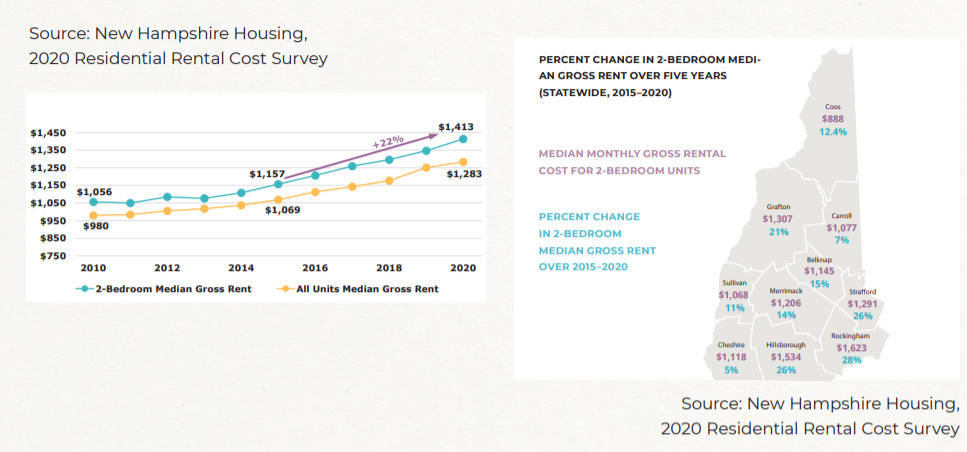
CONCORD, NH – The New Hampshire Department of Health and Human Services on Friday released a three-year Strategic Plan, with a goal of rendering homelessness in NH as “rare, brief and one-time.”
It is the first update to the statewide plan for addressing homelessness since 2006.
On page 29 the Council included this statement on what has changed since the state last updated its plan to end homelessness:
A Note of Comparison to the 2006 Plan
Innumerable things have changed since 2006, the last time New Hampshire had a framework to address homelessness. In reflecting on the 2006 plan, many issues and strategies appear in this 2021 strategy road map. Both plans recommend the need for more housing and additional and coordinated services. The need to look at different ways of financing and funding, as well as addressing special populations. The 2021 plan adds new strategies and connections in an effort to ensure homeless is rare, brief, and one-time. The strategies focus on the connection between street outreach and housing assessments and housing placements. Services in housing are proposed with Medicaid as a funding stream which has the potential for a stable source of funding. Data is a component, looking at system performance measures
across the three Continuum of Care’s (CoC’s). Best practices such as Housing First and low barrier shelter are guiding practices instead of new concepts. There is a greater recognition of the perspectives and needs of people with lived experience in shaping program and policy improvements.
The plan was produced by NH DHHS in partnership with the New Hampshire Department of Business and Economic Affairs and the Community Development Finance Authority, the plan seeks to increase housing availability by 13,500 units by 2024 to ensure that homelessness in New Hampshire is rare, brief and one-time whenever possible.


“With a clear vision and guiding principles, the Council has delivered a strategic plan – including a comprehensive statewide plan on homelessness – that represents a significant step forward in addressing housing stability in New Hampshire,” said Governor Chris Sununu. “The plan serves as a blueprint for our collective efforts – statewide, regionally, and locally – with a focus on alignment, coordination, innovation, and accountability. The end goal: creating improved health, social, educational and economic outcomes for individuals, families and communities.”
Addressing the lack of affordable housing is critical for New Hampshire’s future. The plan includes a three-year, comprehensive, actionable framework to specifically address homelessness across the State, with emphasis on the need for an increase in inventory of affordable housing. Recommendations outlined in the plan include promoting new housing development; reducing barriers to affordable housing; and using a data-driven approach to understand regional needs.
The plan represents six months of efforts by Council members and four working groups with strategic assistance provided by the Corporation for Supportive Housing (CSH), a national technical assistance provider in housing policy. Grants from the New Hampshire Charitable Foundation and Endowment for Health made support from CSH possible.
Page 28 of the 40-page plan provides this overview:
This plan proposes an array of priorities and strategies that use varying combinations of housing and services to both prevent homelessness, to transition people in shelters and on the street as quickly as possible to housing and ensure long term housing stability. Guided by person-centered principles and the overarching goal to have homelessness rare, brief and one-time, the strategies lead to measurable changes in reduction of homelessness and housing instability. This will not happen overnight, and there must be a deep commitment at the state and local-level of leadership, providers, and stakeholders. Homelessness is a complex issue that necessitates a statewide vision to guide the local response by reshaping resource pathways and coordinated actions. This plan is informed by people with lived experience of homelessness, direct services providers, advocates, policymakers, and community developers.
Read the 40-page plan below:
The New Hampshire Council on Housing Stability was established by Governor Chris Sununu under Executive Order 2020-22 on November 18, 2020, and includes stakeholders from across the state, including State leadership, local mayors, and people with lived experience. The Council expects to provide a report each November.
UPDATE: In response to today’s release of the Council on Housing Stability’s Strategic Plan, Mayor Craig released the following statement:
“I’m glad to see the Council on Housing Stability Strategic Plan, which includes the first update to the statewide plan to address homelessness in 15 years. Many of the proposals outlined mirror work that is already happening in Manchester, and I’m hopeful that we can work together to increase affordable housing, prevent and address homelessness and deliver results for the people of New Hampshire. This plan is an important first step, and I look forward to seeing action and results.”
A letter from New Hampshire’s mayors can be found below.







